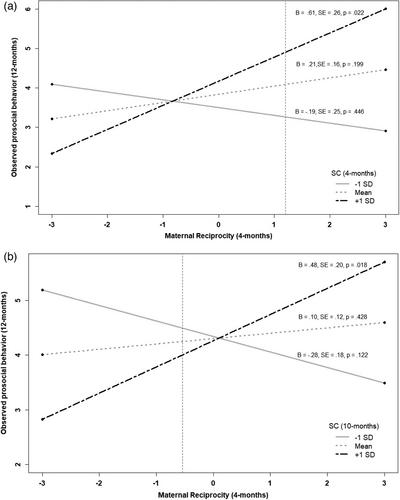Infant sensitivity to social contingency moderates the predictive link between early maternal reciprocity and infants' emerging social behavior
Abstract
The scientific study of love underscores the importance of dyadic reciprocity in laying the foundation for infants’ social development. While research establishes links between early reciprocity and children's social capacities, some infants appear to benefit from reciprocity more than others. A central feature of reciprocity is its contingent structure, that is, the extent to which maternal behaviors are temporally associated with and contingent upon infants’ dynamically changing cues. As such, infants’ sensitivity to social contingencies may define the extent to which an infant benefits from maternal reciprocity. The current study examined the role of infants’ sensitivity to social contingency (SC) in moderating associations between early maternal reciprocity and subsequent infants’ social behavior. The study followed 157 children (47% females), across the first year of life (4, 10, and 12 months) and at preschool age (48 months). Infants' SC at 4 and 10 months moderated the link between early maternal reciprocity and infants' prosocial behavior observed at 12 months. SC at 10 months moderated the link between early reciprocity and reported peer problems at 48 months. Maternal reciprocity predicted more helping behavior in infancy and fewer peer problems at preschool, but only for infants who displayed high SC. Findings highlight the contingent nature of reciprocal mother-infant interactions revealing that an infant's sensitivity to breaks in social-contingency moderates the developmental benefit of reciprocity. Future research is necessary to directly test the underlying mechanisms of these processes and better understand the individual characteristics of infants’ sensitivity to social contingency and its’ role in typical and atypical development.
Research Highlights
- Individual differences in infants’ sensitivity to breaks in social contingencies may moderate the extent to which infants benefit from contingent reciprocal maternal behavior (i.e., maternal reciprocity).
- Maternal reciprocity predicted more helping behavior in infancy and fewer peer problems at preschool, but only for infants who displayed high sensitivity to breaks in social contingency.
- Findings highlight the contingent nature of reciprocal mother-infant interactions revealing that infants’ sensitivity to breaks in social-contingency moderates the developmental benefit of reciprocity.
- Findings emphasize the need to develop measurement methods and direct empirical attention to the important yet understudied individual characteristic of infants’ sensitivity to social contingency and its role in shaping social development.


 求助内容:
求助内容: 应助结果提醒方式:
应助结果提醒方式:


